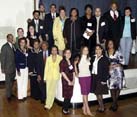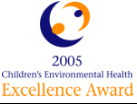


































|
 |
WE ACT's Genes & Justice: A Community Symposium on Health, Race & Rights. Now that the Human Genome Project has completed our genetic map, communities must address the opportunities and challenges posed by scientific progress. This symposium begins a series of conversations for communities of color to assess the implications of the growing role that genetic information plays in our society. Through dialogue, we hope to advance policies that promote health, equity and justice.
 Visit the Genes and Justice section for more details. Visit the Genes and Justice section for more details.
(Posted: Friday, August 31, 2007)
|
 |
WE ACT's NYC Lead Outreach Campaign is a two-year citywide project designed to increase public knowledge about childhood lead poisoning; inform residents about ways to prevent exposure to lead; help correct housing and health problem linked to lead.
 Visit the Campaign's information page for more details. Visit the Campaign's information page for more details.
(Posted: Wednesday, May 2, 2007)
|
 |
WE ACT Co-Sponsors City Council Transportation Committee Hearing on Health Impacts of MTA Bus Operations
A significant portion of Harlem’s asthma epidemic is attributable to or exacerbated by diesel exhaust from buses and the disproportionate placement of diesel bus depots in this community. In addition, community residents cite the idling, traffic and maintenance of the buses as impacting their quality of life because of the noise, vibrations and soot associated with the buses and the depots.
On October 18, 2006, WE ACT co-sponsored a City Council hearing with John Liu, the Chair of the Transportation Committee, to address the safety, health and environmental impacts of MTA bus operations. City Council members heard testimony from community residents, physicians, transit workers, environmental advocates, scientists, and representatives of elected officials – among others.
 Review WE ACT's own testimony along with press coverage for further details. Review WE ACT's own testimony along with press coverage for further details.
(Posted: Monday, October 30, 2006)
|
 |
The COLUMBIA EXPANSION into Manhattanville
In one of New York City's largest and most extensive proposal for a planned development in many years, Columbia University
plans to build a new campus spreading out over eight city blocks along the Manhattanville waterfront in West Harlem.
Requesting that the City make a major change in zoning regulation of 35 acres on the site, Columbia will leave a permanent mark of unprecedented size and scope on the future of the West Harlem community.
 Review WE ACT's Official Written Comments on the Columbia Expansion Draft Scope of Work for more details. Review WE ACT's Official Written Comments on the Columbia Expansion Draft Scope of Work for more details.
(Posted: Monday, January 9, 2006)
|
 |
The WE ACT Environmental Justice Center of New York
By 2007 the future home of WE ACT will be located at 459 West 140th Street in NYC. This landmark, energy efficient building will incorporate replicable environmental technologies, utilize environmentally-responsible ("green") building materials, and employ "green" construction practices in order to showcase some of the ways by which we can co-exist with our surroundings.
 To find out more about how you can do your part, please review our Case Statement on the project. To find out more about how you can do your part, please review our Case Statement on the project.
(Posted: Wednesday, November 30, 2005)
|

West Harlem Environmental Action, Inc. (WE ACT) is a non-profit, community-based, environmental justice organization dedicated to building community power to fight environmental racism and improve environmental health, protection and policy in communities of color.
WE ACT accomplishes its mission through community organizing, education and training, advocacy and research, and public policy development.
Since 1988, WE ACT has worked with citizen groups, youth, community residents, environmentalists, local/state/federal governments, and educational & medical institutions.
WE ACT, a vigorous advocate for and a significant monitor of the Northern Manhattan environment, is a non-profit, incorporated, community-based organization that was staffed in October 1994. WE ACT's mission is to inform, educate, train and mobilize the predominately African-American and Latino residents of Northern Manhattan on issues that impact their quality of life -- air, water and indoor pollution, toxins, land use and open space, waterfront development and usage, sanitation, transportation, historic preservation, regulatory enforcement, and citizen participation in public policy making.
WE ACT seeks to build a more sustainable community through:
- strong advocacy and planning
- community and voter education
- multi-ethnic, multiracial coalition building
- community organizing training and leadership development
- youth leadership development
- monitoring and reporting on environmental enforcement and municipal services' delivery
- constituency building and development of citizen task forces
- organizing informed public participation in policy making
- collaborating on environmental education and public health research with community-based institutions
- multi-media communications
- developing a lead "safe house"
- creating a green business
- creating a Community Environmental Center and training institute in a landmark brownstone to be restored and converted to be energy efficient.
Committed to the Principles of Environmental Justice, WE ACT is an active participant in the national Environmental Justice Movement, and has provided effective leadership in the development of the New York City and the northeast region environmental justice alliances to network, collaborate and impact environmental policymaking.
|
|

Click here to see photos from WE ACT's 2007 Earth Day celebration.

Click here ( 139KB) to read about WE ACT's leadership role as a children's environmental health advocate. 139KB) to read about WE ACT's leadership role as a children's environmental health advocate.
|


Genes & Justice:
A Community
Symposium on Health,
Race & Rights
(Monday, September 24, 2007)


Developing Sustainable
Urban Communities:
An Earth Day
Celebration in Harlem
(Thursday, April 19, 2007)

Manhattan On
The Move
(Thursday, October 12, 2006)

Developing A Greener
Tomorrow: An Earth Day
Celebration in Harlem
(Friday, April 22, 2005)

Breast Cancer
Conference
(Saturday, Oct. 23, 2004)

People of Color
Summit II
(Wed.-Sun., October 23-27, 2002)

Health And
Environmental
Awareness Fair
(Saturday, Sept. 14, 2002)

Alt. Fuels Summit
(Thursday, April 11, 2002)

Human Genetics
(Monday, February 4, 2002)

Alternative Fuels
(Friday, May 4, 2001)
|